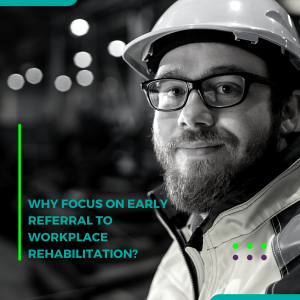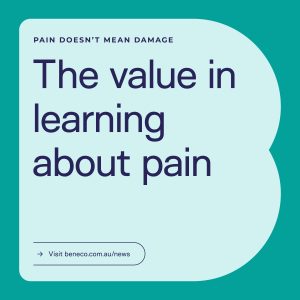Mar 3, 2021
Uncategorized
The importance of early intervention and referral to workplace rehabilitation

WHY FOCUS ON EARLY REFERRAL TO WORKPLACE REHABILITATION?
As stated in the Royal Australasian College of Physicians’ Health Benefits of Good Work position statement, if a person is off work after an injury:
- after just 20 days, the probability that they will ever return to work reduces to just 70%
- at 45 days off work, that chance is reduced to 50%
- at 70 days it’s just 35%.
Australian Rehabilitation Providers Association believes that early referral to a workplace rehabilitation provider (WRP) for specialist early return to work intervention services is one of the most critical factors in supporting an injured worker in achieving a successful return to work outcome.
Across Australia, return to work rates over the last decade have stagnated and in some jurisdictions, such as NSW, return to work rates have significantly reduced. Delays and reduction in referrals are correlated directly to the stagnated / reduced return to work rates, denying injured workers reasonable opportunities to achieve the best recovery and return to work outcome available to them.
Early intervention means starting to plan the worker’s return to work as early as possible once a worker has experienced an injury. Commencing return to work planning and offering support immediately to a worker drastically improves their ability to recover quickly and safely and sustainably return to their job and normal life.
In a research study that looked at the effect of early intervention on return to work, the study found that:
- Those who underwent early intervention were more likely to back at work within 6 months
- Those who underwent early intervention were 50% more likely to return to work at 12 months
- The return on investment (ROI) for every $1 invested in early intervention was $7
- The intervention also had the additional benefit of identifying and eliminating risks for other employees.
Research funded by WorkSafe Victoria found strong evidence that:
- Workplace / occupational rehabilitation interventions are effective at improving RTW outcomes, particularly for musculoskeletal injuries
- Workplace / occupational rehabilitation achieves the best outcomes when
delivered early (2–4 weeks of injury)
ARPA states that innovation and proactive management is key to successful RTW outcomes. People are at the centre of successful rehabilitation and are best managed by qualified and experienced consultants for their rehabilitation needs.
For the full position paper, click here.
Other articles you might be interested in

Jun 27, 2023
The Value Of Learning About Pain
Pain education is a popular approach for persistent pain. This involves learning and provision of education on a variety of pain concepts that are thought to be important to a persons recovery.
Read more
Jan 23, 2023
My Doctor told me to rest...
If you are injured or in the early stages of recovery, do you think it is better to rest or to move? The common belief that if you are injured you are best off resting and staying still so you don’t do any further damage. However, there is lots of scientific research to suggest otherwise.
Read more
Mar 31, 2022
Is surgery doing more harm than good?
The big unknown is that many common orthopaedic surgeries are not better for reducing pain that non-surgical options. There are alternatives that are cheaper, and safer – such as exercise programs. A recent article looked at 3 of the most common orthopaedic surgeries that may be doing more harm than good and costing people more than just their money.
Read more